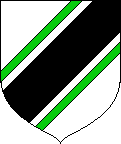Main Page: Difference between revisions
m ([more] link for Page of the Day) |
(New pages of the month) |
||
| Line 35: | Line 35: | ||
</tr> |
</tr> |
||
<tr valign="top"><td style="background-color: #f8ffff; border: 2px solid #e2ffff; border-top: none; padding: 0.6em; padding-top: none;"> |
<tr valign="top"><td style="background-color: #f8ffff; border: 2px solid #e2ffff; border-top: none; padding: 0.6em; padding-top: none;"> |
||
'''[[Troubadour]]s''': The nature and origins of the troubadour repertoire hold a remarkable place in the history of music. Its origins are remarkable because they seem to have burst forth as an already developed form with no antecedents. Its nature is remarkable because its fortunes are so closely linked to the fortunes of its homeland in the south of [[France]], known as [[Occitania]]. |
|||
| ⚫ | |||
'''[[Malcolm II]]''' was the last [[king]] of [[Scotland]] to be elected by the method of ''tanistry'', by which an heir to the throne was selected during a monarch's lifetime. He was the son of [[Kenneth II]] (born c.958) and first cousin to his predecessor, [[Kenneth III]]. He was also the last king of the House of [[Alpin]], as he had no sons to succeed him. |
|||
The man credited with the genesis of the troubadour tradition is [[Guilem de Peitieu]], 9th Duke of Aquitaine and 7th Count of Poitiers, one of the most powerful feudal lords of his day. He was the inspiration for most later poets who were to follow in the troubadour tradition.<small> ... [[troubadour|[more]]]</small> |
|||
<small> ... [[Malcolm II|[more]]]</small> |
|||
</td> |
</td> |
||
<td></td> |
<td></td> |
||
<td style="background: #fff3ff; border: 2px solid #ffddff; border-top: none; padding: 0.6em; padding-top: none;"> |
<td style="background: #fff3ff; border: 2px solid #ffddff; border-top: none; padding: 0.6em; padding-top: none;"> |
||
| ⚫ | |||
[[image:Lion_Couchant.png|thumb|right|A [[lion]] couchant]] |
|||
'''Heraldic jargon: ''': An [[ordinary]] which is '''cotised''' has a narrow line, or cotise, running parallel to its edges. Cotising an ordinary is considered as adding a secondary charge. The cotise is typically depicted as 1/4 of the width of the ordinary. |
|||
'''Heraldic jargon: ''' '''[[Couchant]]''' depicts an [[animal]] lying down with its head up. |
|||
'''Dance:''' [[ |
'''Dance:''' [[Stingo]] |
||
'''Fibre arts:''' [[ |
'''Fibre arts:''' [[Tablet weaving]] |
||
'''Recipe:''' [[ |
'''Recipe:''' [[Peeres in confyt (recipe)|Peeres in confyt]] |
||
<small>[[Cunnan:Page of the Month|More details on the Page of the Month.]]</small> |
<small>[[Cunnan:Page of the Month|More details on the Page of the Month.]]</small> |
||
Revision as of 01:16, 2 October 2005
Welcome to Cunnan, a Wiki collecting information for re-enactors of the Middle Ages and Renaissance with a heavy slant towards members of the SCA.
Cunnan is the largest SCA wiki in the world - anyone can edit our articles. You should be bold in updating pages! Articles can only be improved if people are contributing new information and improving old information. So add research information, how-to pages, event information and anything else you can think of. Cunnan should be applicable worldwide, so be mindful of regional differences - use comments such as "In Lochac...". If you see anything that is different in your area, add a note on your local variation.
| January 28: | Cunnan now has more than 4,205 articles! |
| December 28: | Cunnan's software has been upgraded. If anything is broken you should leave a note at the Village pump. |
| Page of the Month | Other Features | |
|---|---|---|
|
Troubadours: The nature and origins of the troubadour repertoire hold a remarkable place in the history of music. Its origins are remarkable because they seem to have burst forth as an already developed form with no antecedents. Its nature is remarkable because its fortunes are so closely linked to the fortunes of its homeland in the south of France, known as Occitania. The man credited with the genesis of the troubadour tradition is Guilem de Peitieu, 9th Duke of Aquitaine and 7th Count of Poitiers, one of the most powerful feudal lords of his day. He was the inspiration for most later poets who were to follow in the troubadour tradition. ... [more] |
Heraldic jargon: : An ordinary which is cotised has a narrow line, or cotise, running parallel to its edges. Cotising an ordinary is considered as adding a secondary charge. The cotise is typically depicted as 1/4 of the width of the ordinary. Dance: Stingo Fibre arts: Tablet weaving Recipe: Peeres in confyt |
